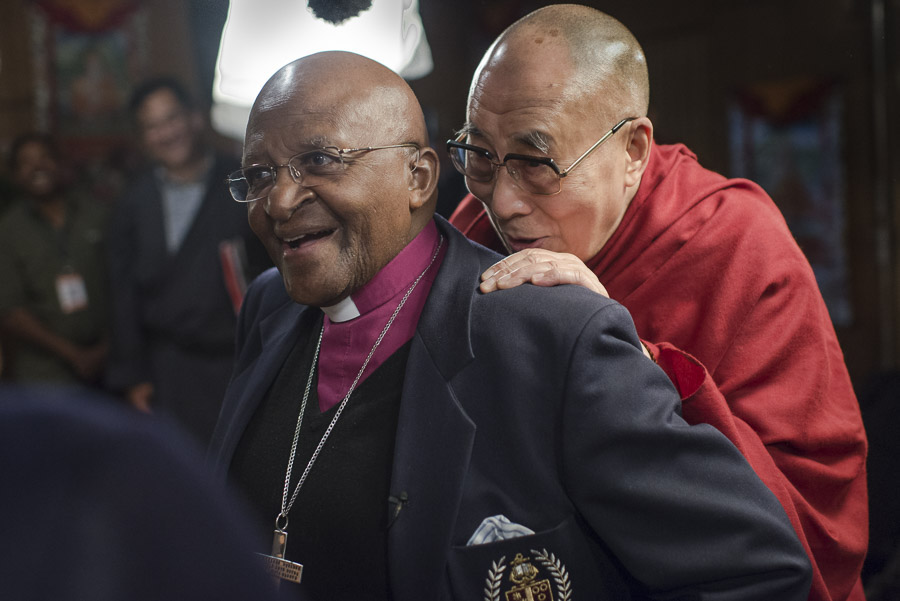We are in the midst of a historic week, and regardless of how you voted, we all must now find a way to heal and move forward.
In order to help us do that, Maria Shriver turned to someone she admires, someone who knows a thing or two about bridging the divide, about healing and about forgiveness. That person is Archbishop Desmond Tutu. Archbishop Desmond Tutu and His Holiness Dalai Lama recently published a new book, The Book of Joy. The book is about finding lasting happiness in a changing world. Both of these extraordinary men have always used their voices to inspire the world and to move humanity forward.
She posed this question to Archbishop Tutu: “How can the United States find peace and heal as a nation?” He prepared the following statement exclusively for our Architects of Change community and our Sunday Paper readers, as part of the preparation for his book, The Book of Joy.
First, we should say, thank God for America. America not only helped us so profoundly in our transition to democracy, but has been a beacon of what is possible when a great nation is good and generous.
We have been watching with some deep concern as these elections have torn the social fabric of the United States and as civility and tolerance have been replaced by anger and prejudice. Each side now must come together and realize that you share a greater goal than victory, which is the development of a country that serves all its people and that leads the world to a greater destiny. The only way to peace and healing is to turn to one another and try to understand what motivates such fear and anger. The anger over inequality and injustice, whether in America or South Africa, is real and must be addressed, for a country is only as strong as its weakest and most vulnerable citizens.
Despite great progress, America still faces poverty, racism, sexism, homophobia and more. These are not just American issues; they are global issues, and we must understand that it takes time for us to grow: to become compassionate and to become just and to become tolerant. But we are good, and we are learning to be more loving, and more inclusive, and more generous. We must fight for the rights of all who have been excluded from the great banquet of opportunity that is America. We have seen great advances, such as the landmark Supreme Court case in 2015 that legalized gay marriage. When the laws change, the culture changes and in time our hearts and minds change. Eventually, the new generations look back and wonder how could it have ever been any other way.
My objective has always been to create a democratic and just society without racial divisions. There is much work to be done. In South Africa, political apartheid has been replaced in many ways by economic apartheid, where the spoils of our wealthy country are enjoyed by a limited few. In America, you also have much racial inequality and injustice, but it is hopeful to see these issues being recognized and discussed. There has never been anything like a truth and reconciliation commission to heal the wounds of slavery and of generations of racism in America, and when we do not deal with the past, it does tend to haunt us.
This has been a painful election. One cannot change what has happened, but one can seek to forgive and reconcile. Forgiveness comes from recognizing our shared humanity. Forgiveness opens us up to the possibility of more joy.
As my friend the Dalai Lama has said, joy really can be the basis for peace in a country and in our world. When a family is joyful, it is peaceful. When countries are joyful, they will be peaceful. Joy is much bigger than happiness. While happiness is often seen as being dependent on external circumstance, joy is not. Our greatest joy is when we seek to do good for others. We are not banished from the kingdom joy by experiencing or witnessing suffering. The Dalai Lama and I try to offer the keys to that kingdom that we have found in lives that have not been exactly turmoil free. Yes, what one finds is that nothing beautiful comes without some suffering. It is how we face all of the things that seem to be negative in our lives that determines the kind of person we become.
I am often asked what keeps me feeling hopeful in the world. Well, it’s not a “what” that keeps me hopeful, but a “who” — all of these extraordinary people who are trying so hard to create a world with more joy, and more love, and more sharing. Look in the mirror.
It is so easy to be swept up in the pain and horror of the news, and it is quite painful and horrible, but we must remember these incidents are news because they are the aberrations. They are the exceptions. When one looks, as the Dalai Lama said in Dharamsala, at all the love that is given on our planet every day, from parents to children, from teachers to students, from doctors and nurses to patients, one realizes that we really are meant for goodness and love and generosity. We will create a better world, and sometimes you want to whisper into God’s ear and say, “hurry up”! It does take us time, but we will get there.


